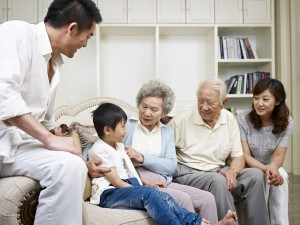"People who need people …" is more than just a phrase from a popular song. Having friends and outside interests can make a difference in living longer and healthier lives.
Everyone needs to feel loved and supported-especially as we grow older. As we age, friends truly can be lifesavers. The friend who brings the chicken soup makes as much difference in feeling better faster as the soup itself. Conversation, sharing, being in touch with others who have active, involved lives gives living a purpose. Sharing with friends helps multiply the joys and divide the sorrows.
Large, extended families that were often available for support are now fewer. The number of one-person households has increased. People often move far from their families to work or retire. But staying connected to family, friends and activities has never been more important.
Several studies report fewer colds, lower blood pressure and lower heart rates in participants with strong social ties. Statistics show that marriage, perhaps the strongest tie, adds years to life expectancy. And suicide, mental illness and alcoholism rates are much lower when people feel a sense of belonging. Evidence of the benefits of social interactions was found in these studies:
In one study, medical students who were assigned to work in pairs had lower stress levels than those who were assigned to work alone.
Another study reported that elderly people who like to eat out, go to movies and take part in other social activities live an average of two and a half years longer than people who spend most of their time alone. The physical health benefits of socializing were equal to physical exercise, even though the social activities involved almost no physical exertion. It wasn't physical activity or physical health but feeling worthwhile that led to longer life. Good health and eating counted, but it was social interaction that was responsible for the results.
In one experiment, paid volunteers had a cold virus sprayed in their noses. The people with very few or no social contacts were four times more likely to come down with cold symptoms than those with lots of social contacts.
E-mail, video conferencing and chat rooms have allowed people to stay in touch with friends and relatives and even create relationships with people they haven't met. These cyber-friends can provide support, involvement and encouragement. Help with emotional problems is available on the Internet, and seeking this kind of help will become more common. Perhaps people's need for connection explains the popularity of computers and e-mail, even in aging populations. Grandparents of many ages feel great satisfaction in "logging on" to talk to their grandchildren.
Tutoring, mentoring, playing cards, walking, singing together, sitting and talking, having a student pen pal at a local school, going to the movies, joining a book discussion group, volunteering or working at a paid job are ways to become or stay involved. Friendship, love and support are lifelines to be shared. It's never too soon to start building relationships.
By Ellen Gold
© 1999 Lifescape. All rights reserved.
Everyone needs to feel loved and supported-especially as we grow older. As we age, friends truly can be lifesavers. The friend who brings the chicken soup makes as much difference in feeling better faster as the soup itself. Conversation, sharing, being in touch with others who have active, involved lives gives living a purpose. Sharing with friends helps multiply the joys and divide the sorrows.
Large, extended families that were often available for support are now fewer. The number of one-person households has increased. People often move far from their families to work or retire. But staying connected to family, friends and activities has never been more important.
Several studies report fewer colds, lower blood pressure and lower heart rates in participants with strong social ties. Statistics show that marriage, perhaps the strongest tie, adds years to life expectancy. And suicide, mental illness and alcoholism rates are much lower when people feel a sense of belonging. Evidence of the benefits of social interactions was found in these studies:
In one study, medical students who were assigned to work in pairs had lower stress levels than those who were assigned to work alone.
Another study reported that elderly people who like to eat out, go to movies and take part in other social activities live an average of two and a half years longer than people who spend most of their time alone. The physical health benefits of socializing were equal to physical exercise, even though the social activities involved almost no physical exertion. It wasn't physical activity or physical health but feeling worthwhile that led to longer life. Good health and eating counted, but it was social interaction that was responsible for the results.
In one experiment, paid volunteers had a cold virus sprayed in their noses. The people with very few or no social contacts were four times more likely to come down with cold symptoms than those with lots of social contacts.
E-mail, video conferencing and chat rooms have allowed people to stay in touch with friends and relatives and even create relationships with people they haven't met. These cyber-friends can provide support, involvement and encouragement. Help with emotional problems is available on the Internet, and seeking this kind of help will become more common. Perhaps people's need for connection explains the popularity of computers and e-mail, even in aging populations. Grandparents of many ages feel great satisfaction in "logging on" to talk to their grandchildren.
Tutoring, mentoring, playing cards, walking, singing together, sitting and talking, having a student pen pal at a local school, going to the movies, joining a book discussion group, volunteering or working at a paid job are ways to become or stay involved. Friendship, love and support are lifelines to be shared. It's never too soon to start building relationships.
By Ellen Gold
© 1999 Lifescape. All rights reserved.


